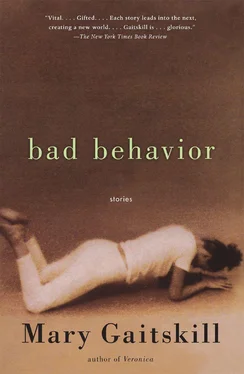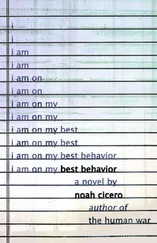He couldn’t stand weak women.
He went to a nightclub in the evening with his friend Jerry and two of Jerry’s hulking lawyer friends. They went to a club that made them and a lump of other people line up outside the door for inspection by a haughty doorman who might or might not admit them, depending on whether or not he liked their appearance. Joel and Jerry, with the lawyers, had to wait an inordinate length of time while a series of habitual clubbers insouciantly gained entrance. It could’ve been humiliating, but instead it was an intriguing form of entertainment, a piece of behavior to be observed. One of the lawyers kept saying, “I don’t want to go in there anyway. This is a drag. Let’s go somewhere else.”
“No, it’s really good in here,” said Jerry. “You’ll see.”
They eventually gained admission and roamed the three floors of the club, greedily looking around. Joel drank one paper cup of watered-down alcohol after another and stared at the moiling sweat-dampened crowd with an attitude of wistful contempt. They were coiffed like Dr. Seuss characters and dressed like children in their parents’ clothes. At one time he had wanted to be like them. Now he thought they were stupid, although he still liked to look at them. He saw a girl standing alone at a bar, dressed like a twelve-year-old’s idea of a hooker. Tight black bodice, short flared ballerina skirt. She was small, she stood with her ankles together. He edged along the wall, pretending to study the material hung up as art. He remembered the blow-up doll he had once hung up in his Ann Arbor apartment as a party decoration. It wore Sara’s clothes and bore, with Scotch tape, a sign that read “Hurt Me Beat Me Fuck Me.” Wilson had said, “Joel, come on. This is too much. It’s not funny.” Joel continued toward the girl at the bar, fighting the anxious crimp in his shoulders.
The terse conversation with her didn’t result in her phone number on a piece of paper in his pocket. He found the lawyers again and stalked around with them, making jokes. They couldn’t find Jerry, so the three of them got into a cab and left together, a trio of masculine shoulders filling the paned-in back seat with gruff laughter and blurted comments.
He entered his dark, narrow-halled apartment in a grainy mental state. He stopped briefly before the toilet on his way to bed. He stripped off his clothes and dropped them in the middle of the floor. He lay on his back and put one hand on his cock. He imagined dozens of intriguing images, perusing the possible nuance of each circumstance. There was Cecilia. There was the girl at the bar. There was Sara. “Get my belt,” he had said to her. She hesitated. “Don’t you think you deserve it?” He masturbated watching spread-legged Sara arch her neck and rub her injured-looking vagina. He finished. He mopped his abdomen with a “snot rag.” A memory separated from the fantasy and lingered.
“I love you,” said Sara.
“It’s not real,” he said. “It’s puppy love.”
“No. I love you.” She nuzzled his cheek with her nose and lips, and her tenderness pierced him.
The image became tiny and unnaturally white, was surrounded by darkness, then faded like the picture on a turned-off TV.
SUSAN HAD NOT been in Manhattan for five years, and she had been looking forward to this visit as a gorgeous wallow in sentimentality and the mild pain of déjà vu. The first three days had been just that. She had gone on long walks, visited with old friends and sat in cafés she’d once frequented as a thin, long-haired girl, lonely and worrying over tea. She had wandered through these days desultorily, enjoying the odd mix of memories and emotions that playfully showed their shadows and vanished again.
She had been walking on Bleecker toward Lafayette when a tiny, youthful bag lady entered her vision. She was standing still in the middle of the sidewalk, one hand out, the other daintily holding a small plastic garbage bag as though it were a pocketbook, begging from everyone and looking at no one. Her torn sweater, ragged skirt and wool socks were drably color-coordinated; her small head was tilted at an odd birdlike angle that was an unintentional caricature of childlike curiosity. Her clearly once-beautiful face was as still as her body; her full lips, potentially so expressive, were held fixed and tight. Her stillness amidst the march of New Yorkers made her look lost and groundless, but there was an intensity about her, and a feeling of heat, as though she were exuding some sticky substance from her pores. The quick feeling of panic in Susan’s stomach made her turn and walk the other way before she had a mental reaction; when she figured out why she was upset, she felt even worse. The bag lady looked exactly like Leisha, her best friend many years ago. Her face, posture, even the style of her rags recalled Leisha.
Susan turned a corner and stopped against a wall, her heart beating miserably. She remembered an article or a talk show or something where a smug somebody discussed the problem of chance meetings with old friends who were not as successful as you, and how you could avoid rubbing it in. She thought: This could not be Leisha. She had not seen or spoken to Leisha since their unhappy falling-out six years ago. The last time Susan had heard from her was when she received an invitation to Leisha’s wedding (she was marrying an attorney at a country club), which Susan had scornfully thrown in the trash. Surely even Leisha couldn’t have gone from being a well-off wife to a bag lady in six years. And even if she had, she had a middle-class family ready (and alert for just this purpose) to sweep her into its bosom. Still, anything was possible, and, as Leisha herself had constantly pointed out, she was very unstable. She was unskilled except as a waitress, and Susan had always worried about what would happen to her once she lost her beauty.
Turning the corner wasn’t simply a selfish desire to avoid unpleasantness; Susan could imagine the pain that Leisha would feel if she was recognized, and it made her cringe. But she would have to get her off the street, buy her a meal, get in touch with her family and so on. She acknowledged and then stifled the idea that her old friend might be too disturbed to remember her, and was appalled to suddenly identify a part of herself that was satisfied, even pleased, at the thought of Leisha the bag lady. This part of her wanted to help Leisha, but only out of duty and the pleasure of condescension; their friendship had ended angrily. Susan dropped her head and covered her face with her hands, raising it to the gawking gaze of a passing teenager.
She stepped into the sidewalk march again, and the bag lady was gone. No, there she was, standing against the wall. Susan walked right up to her and started to speak, then realized that the woman wasn’t Leisha. The stranger looked at her with mild, glassy eyes (hazel, not dark brown) and put out her hand. Relieved but disconcerted, Susan groped through her purse, found five dollars and pressed it into the pinched little hand. The woman put it away without looking at it and said, “Jesus loves you.”
Susan walked back to her friend’s apartment via Eighth Street, becoming depressed as she was reminded of expeditions with Leisha for shoes. Leisha had been part of an amorphous body of memories provoked by this visit to Manhattan, but now she was the lens through which all the other memories were seen, Susan cursed her impressionability and tried to think of something else.
Susan was thirty-five years old, and Leisha thirty-four. When they were friends, Susan was an aspiring writer and Leisha an actress. Whenever she had a positive image of Leisha — a rarity during these last six years — she saw them together in Leisha’s apartment drinking tea, drinking wine, snorting coke, something, and talking about their careers. Leisha had loved the word “career.” “I think it’s going to happen for you really first,” she’d say. “Like boom , your career’s just going to skyrocket — I mean it.”
Читать дальше












